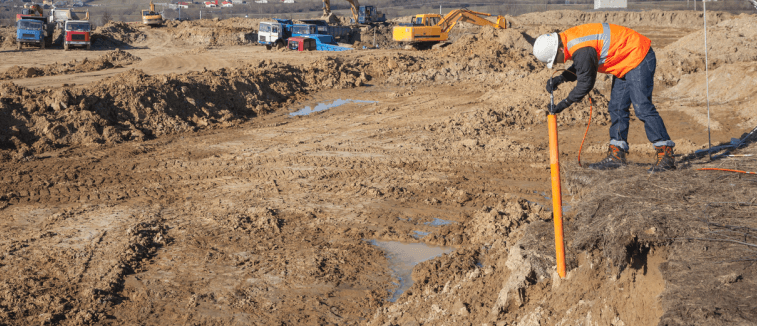Not known Details About Geotheta
Not known Details About Geotheta
Blog Article
The Best Guide To Geotheta
Table of ContentsGeotheta - QuestionsA Biased View of GeothetaThe 3-Minute Rule for GeothetaHow Geotheta can Save You Time, Stress, and Money.All about Geotheta

They conduct site examinations, accumulate samples, carry out lab tests, and assess information to evaluate the suitability of the ground for building and construction projects - Consulting Engineer. Based upon their searchings for, geotechnical engineers provide referrals for foundation style, slope security, maintaining structures, and mitigation of geotechnical threats. They work together with other professionals, such as engineers, architectural engineers, and building groups, to guarantee that geotechnical considerations are incorporated right into the overall task design and execution
By analyzing the actions and residential or commercial properties of dirt and rock, they can recognize possible geotechnical hazards such as landslides, dirt negotiation, or slope instability. Their know-how aids avoid failures or mishaps that could jeopardize lives and home. Below are some thorough obligations and obligations of a geotechnical designer: Website Investigation: Geotechnical designers conduct site investigations to collect information on subsurface problems.
They analyze the data to comprehend the residential or commercial properties and actions of the soil and rock, including their strength, permeability, compaction attributes, and groundwater problems. Geotechnical Evaluation and Layout: Geotechnical designers evaluate the information collected throughout site examinations to evaluate the stability and suitability of the site for building and construction jobs. They perform geotechnical computations and modeling to examine variables such as birthing capacity, negotiation, slope security, lateral planet stress, and groundwater flow.
The 10-Minute Rule for Geotheta
Foundation Layout: Geotechnical designers play an essential duty in designing foundations that can securely sustain the desired structure. They analyze the dirt conditions and load requirements to establish the suitable foundation kind, such as shallow foundations (e.g., grounds), deep structures (e.g (https://pubhtml5.com/homepage/jugmn/)., piles), or specialized strategies like soil enhancement. They think about variables such as settlement limits, birthing capacity, and soil-structure interaction to establish optimum foundation styles
They examine construction strategies, screen site activities, and carry out field inspections to validate that the style recommendations are followed. If unforeseen geotechnical issues occur, they assess the circumstance and offer referrals for remediation or adjustments to the style. Danger Analysis and Reduction: Geotechnical designers examine geotechnical hazards and risks connected with the task website, such as landslides, liquefaction, or dirt erosion.

Collaboration and Interaction: Geotechnical engineers function carefully with other experts find this associated with a task, such as architects, architectural engineers, and building groups. Efficient interaction and partnership are vital to integrate geotechnical considerations right into the overall job design and construction process. Geotechnical engineers provide technological expertise, answer queries, and guarantee that geotechnical demands are fulfilled.
Little Known Questions About Geotheta.
Below are some kinds of geotechnical engineers: Structure Engineer: Structure designers focus on developing and examining structures for frameworks. They assess the dirt conditions, load needs, and site features to determine one of the most appropriate foundation kind and style, such as shallow foundations, deep foundations, or specialized methods like pile foundations.
They assess the variables affecting incline security, such as soil homes, groundwater problems, and incline geometry, and develop strategies to avoid slope failings and alleviate dangers. Quake Designer: Quake engineers focus on evaluating and developing structures to withstand seismic pressures. They analyze the seismic danger of a site, assess dirt liquefaction possibility, and create seismic design requirements to guarantee the security and resilience of frameworks throughout quakes.
They do area testing, collect examples, and examine the accumulated information to define the soil residential or commercial properties, geologic formations, and groundwater problems at a site. Geotechnical Instrumentation Designer: Geotechnical instrumentation designers focus on tracking and determining the behavior of dirt, rock, and structures. They set up and preserve instrumentation systems that monitor variables such as dirt settlement, groundwater degrees, slope movements, and architectural displacements to assess efficiency and offer early warnings of possible issues.
Geotheta Things To Know Before You Buy
They perform tests such as triaxial examinations, loan consolidation tests, straight shear tests, and permeability examinations to gather data for geotechnical analysis and design. Geosynthetics Designer: Geosynthetics designers specialize in the design and application of geosynthetic materials, such as geotextiles, geogrids, and geomembranes. They utilize these products to boost soil stability, reinforce slopes, give drain remedies, and control erosion.
They often tend to be investigatory people, which implies they're intellectual, introspective, and inquisitive. They are curious, methodical, logical, logical, and sensible. Some of them are likewise social, implying they're kind, charitable, participating, person, caring, valuable, compassionate, skillful, and friendly. Does this noise like you? Take our complimentary profession test to learn if geotechnical designer is among your leading job matches.
In the office setting, geotechnical engineers use specialized software devices to execute estimations, produce styles, and assess information. They prepare reports, review task requirements, interact with customers and employee, and coordinate project tasks. The workplace setup offers a helpful setting for study, analysis, and collaboration with other specialists included in the project.
4 Easy Facts About Geotheta Shown
They frequently check out project websites to conduct website examinations, analyze geotechnical conditions, and collect data for analysis. These gos to entail traveling to various areas, often in remote or challenging terrains. Geotechnical engineers might perform dirt sampling, conduct tests, and display building tasks to ensure that the geotechnical elements of the project are being applied appropriately.
Geotechnical designers likewise function in specialized geotechnical labs. Geotechnical laboratory designers work extensively in these settings, handling screening tools, running tools, and taping information.
Report this page